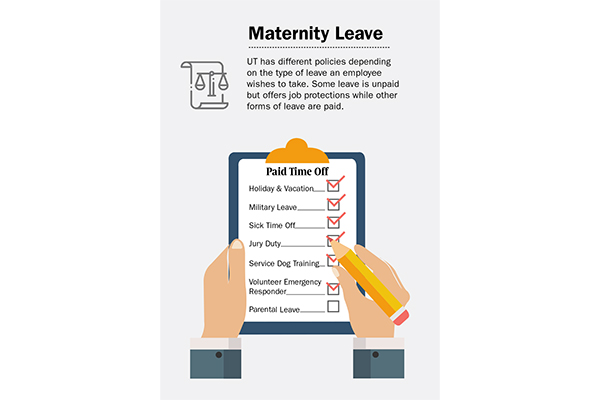Hardly any bills have been filed in the Texas Legislature concerning parental leave policies, but some UT employees think more could be done to support employees who have children.
“It’s crazy that the U.S. is so behind when it comes to paid parental leave because I think that we’re one of the only industrialized nations that doesn’t offer paid parental leave,” said Sarah, a UT employee whose name has been changed to protect her job. “Employers need to catch up to that and recognize that women should be compensated while they’re on leave, and they should be guaranteed their job when they return.”
Another UT employee, Jane, whose name has also been changed, said she was a teaching assistant when her child was born and didn’t qualify for any time off.
“I was back at the lectern as a guest lecturer and TA when my son was 17-days old,” Jane said in an email. “He came to class with me to teach over the course of about seven weeks that semester.”
State Rep. Thresa Meza, D-Irving, said employers are hesitant to provide paid maternity leave because of the cost.
“They don’t want to incur the cost of the leave and (lose) the money that it would take to pay someone to be out if (the employers are) not getting the productivity from the person,” Meza said.
Meza filed House Bill 1559, which would require employers to allow their employees to take 30 days of leave not just for childbirth but also other life-changing encounters, such as sexual assault. Under HB 1559, employees must be able to use accrued paid sick leave for all of these things, something UT already does.
“Our (bill) is more of a compromise bill between what you and I might think of as the ideal thing for employers to do for us women when we’re having a baby,” Meza said.
UT employees don’t get a separate policy for maternity or parental leave. Instead, they dip into their accrued sick leave or work out other arrangements with their superiors.
“There is not a leave referred to as ‘maternity leave,’” said Adrienne Howarth-Moore, interim associate vice president for Human Resources, in an email. “However, the University does provide a variety of state governed paid and unpaid leave options to support employees that choose to expand their family through birth, adoption or foster care placement.”
UT employees have paid time off for vacations, sick days and military leave. Since UT is a state agency employer, employees can also get paid time off for training a service dog, donating blood and voting.
Under current state law, Texas does not have paid maternity leave, instead offering employees 12 weeks of unpaid leave and a guarantee of returning to the same job they left.
Howarth-Moore said UT is unable to create new leave types, such as maternity leave. Instead, UT allows employees to supplement their 12 weeks off with other forms of paid leave.
“Employees will use their accrued paid sick leave concurrently to provide salary continuation while they are on job-protected leave recovering from a medical event, such as a birth event,” Howarth-Moore said.
Employees can also file disability claims to supplement their leave or use the sick leave pool in which colleagues can donate sick leave hours to each other, Howarth-Moore said.
Sarah said there’s a lot more work to be done to support working parents.
“The more that we as a society can value working moms and working parents, the more benefits we’ll hopefully get,” she said.





















